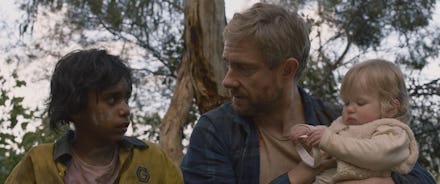Netflix’s ‘Cargo’ is the latest genre film to reckon with Australia’s treatment of indigenous people

At first glance, Cargo, Netflix’s latest original film, is just another zombie movie. Zombie plague breaks out, man becomes infected, man fights to keep his baby daughter from becoming infected, too. It’s a classic sort of tale. But as the film progresses, the layers peel back to reveal something much more complicated — and worthy of attention.
Cargo is one of a handful of recent Australian films that have used genre trappings in order to shed light on the country’s history. As counterintuitive as it might seem, the zombie narrative doesn’t swallow up Cargo’s inspection of Australia’s troubling record with its indigenous people; rather it helps to bring those aspects of the story out. The extreme circumstances created by the epidemic are met with extreme reactions from the people enduring them and exacerbate the fault lines in the local community.
As Andy (Martin Freeman) tries to find a safe haven, he comes across several different groups of survivors, including Vic (Anthony Hayes), a white man whose reaction to the epidemic has been to give in to his internalized racism and to use abducted black people as zombie bait and for the sake of sport. Obviously, this behavior has only worsened relations with the neighboring indigenous tribe, which seems to have learned how to survive, as it’s made up of the people to whom the land originally belonged. Directors Yolanda Ramke and Ben Howling have created a film that’s uncomfortably close to the current global political moment and done so through a genre that, despite the cleverest of its predecessors (Night of the Living Dead, et al.), has long been given short shrift in terms of social and artistic relevance.
The effect of British colonization on Australia, which began in the late 1700s, was so severe the indigenous population was almost completely wiped out. On top of that, the indigenous people of Australia were forced from their land (not unlike the experience of Native Americans) and, in some cases, enslaved. The struggle over land persists to this day, as do the ramifications of the move to force indigenous children into state care, which occurred between 1910 and 1970; presently, there’s still an inequality when it comes to quality of life between the indigenous people and the rest of the country’s population. It’s an ugly history, and recent years have seen it explicitly addressed in film.
Director Warwick Thornton’s Sweet Country, which was released in the U.S. earlier this year, does so by placing itself in the middle of history.
“There is quite a bit of Australia’s dark past that has become increasingly the subject of discussion,” actor Sam Neill said in an interview with the Village Voice, speaking of Sweet Country. “It’s really only now that people are becoming aware of what happened.” Unlike Cargo, Sweet Country is a period piece set in Australia in 1929. However, like its contemporary, it’s a genre piece, using the tropes inherent in its chosen lane to make a point. Thornton’s film could easily be taken as a surface Western without making much of its context in Australian history, but to disregard the deeper themes would be to do the film a disservice.
The film centers on Sam (Hamilton Morris), who commits a murder in an act of self-defense. Knowing he won’t have a fair shot in court, he goes on the run. The key detail here is that Sam is an indigenous farmer; his chances in court have less to do with his story than with the color of his skin, and even when, at the end of the film (spoiler alert), Sam is miraculously acquitted, the politics of the time period don’t allow for a happy ending.
Neill plays the one white character sympathetic to the farmer’s cause, but even he isn’t free from blame for the unfolding events. As a preacher, he’s just as much a part of the effects of colonization as the rest of the people around him, and his mission to spread Christianity isn’t necessarily a helpful one. The film’s refusal to absolve anyone of blame is rare — after all, the term “white savior complex” exists for good reason.
Goldstone, another Australian Western, which was released in Australia in 2016 and stateside in 2018, manages a similar kind of balancing act. The film, directed by Ivan Sen, begins with a missing person investigation before unfolding into a tale about land. It is startlingly direct in its inspection of the long-term (and ongoing) displacement of Australia’s indigenous people as well as persisting issues with race. It, of course, helps the movie’s message that the story’s hero, Jay (Aaron Pedersen), is himself of indigenous descent. By virtue of that fact alone, he’s already seen as an outsider, and because he’s looking for a missing Chinese girl (a sex worker, at that), the town wants him gone.
The film also makes its connection to the past clear as it opens with a set of photographs from the Australian gold rushes, which began in the middle of the 19th century and persisted until the beginning of the 20th, before plunging into the present. The faces of Australia’s indigenous people — as well as those of Chinese immigrants — flash by, reminding the audience of the country’s history with its indigenous people and the Chinese immigrants who came to the country as indentured or contract laborers and were subjected to anti-Chinese sentiment and the resulting violent riots.
Cargo, Sweet Country and Goldstone are remarkable for their frankness in addressing Australia’s history, as well as its present circumstances. Again, it’s a matter of defying expectations while honoring experiences. Zombie movies might not seem to lend themselves to a dissection of history, and Westerns can get away with pure gunslinging as opposed to serious introspection, but these three Australian films have all managed to use their respective genres to do something fresh: They look backward without feeling backward-looking.